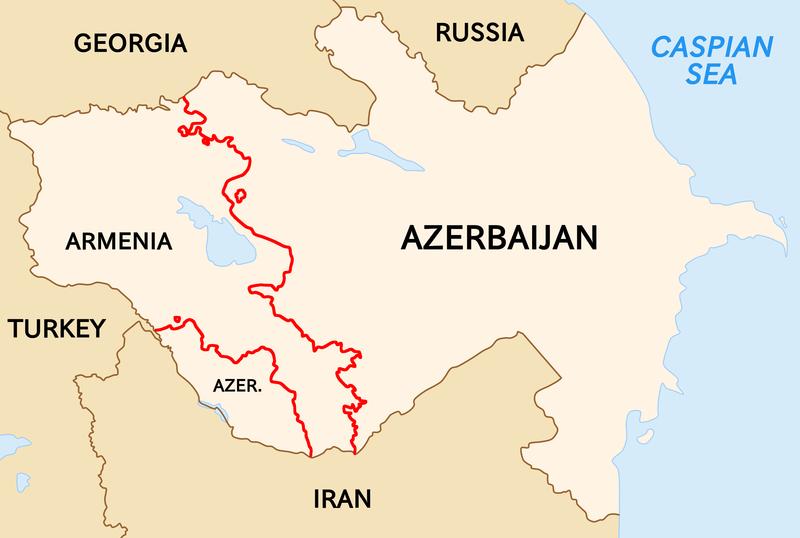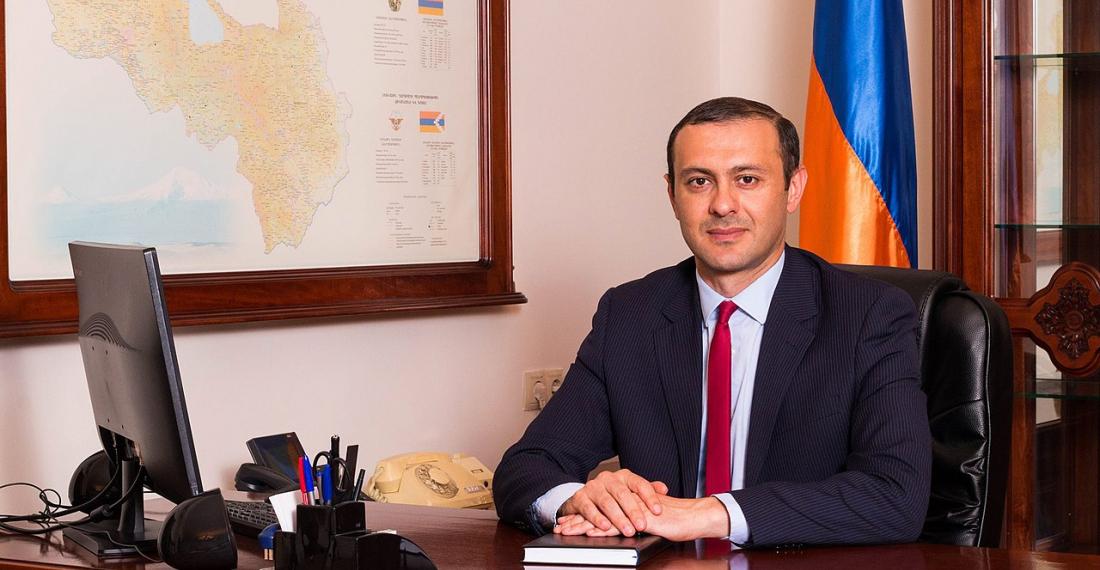Armen Grigoryan: The portrait of an unreformed irredentist Contemplations with Orkhan Amashov/VIDEO
In the latest edition of ‘Contemplations’, Orkhan Amashov examines the question as to why Baku doubts Armenia’s sincerity regarding the latter’s renunciation of any territorial claims against Azerbaijan, in the context of Secretary of Security Council Armen Grigoryan’s latest inflammatory remarks.
There is no expectation in Baku that the political leadership in Yerevan should, at this very juncture, engage in guilt-induced self-flagellation over what was a three-decade-long illegal Armenian occupation of Azerbaijan’s sovereign territory, or that, as a matter of immediate urgency, Pashinyan and his underlings should articulate a tirade of confessions, renouncing their sins and failures committed both before 2020 and thereafter.
There are limits to what could be expected of Yerevan just now, and Azerbaijan is conscious of those constraints. To be brief, Baku’s principal demand is that Armenia should remove the offending “miatsum” (unity) provision, amounting to unveiled territorial pretensions against Azerbaijan, from its constitution, as this amounts to a major obstacle inhibiting the conclusion of a peace deal between these two nations.
Plus, Baku is weary of any attempts by Yerevan to give new lifeblood to the subject involving the Karabakh Armenians, in any form or shape, directly or indirectly, within the confines of the peace process. It is also vital that any statement uttered by Armenian officials should not be perceived as disrespectful of Azerbaijani territorial integrity. All of these sensibilities are centred around Baku’s scepticism as to the sincerity of Armenia in the context of renouncing its territorial claims against Azerbaijan.
In this vein, the remarks made by Armen Grigoryan, Secretary of Armenia’s Security Council on 26 July are of particular relevance here. Referring to the events of 2020 and 2023, which culminated in the full restoration of Azerbaijani sovereignty over Karabakh, he said the following, and I quote:
"We were completely dependent on Russia. Russia came, took Nagorno-Karabakh away from us, returned it to Azerbaijan, and then left: that's the whole reality. I maintain that Russia has seized Nagorno-Karabakh. Without Russia's permission, there would have been no war."
Allow me to be slightly pedantic, at the outset. The question that needs to be asked, and preferably answered, is that if indeed Russia “took Karabakh away from Armenia” and “handed it over back to Azerbaijan”, then why, in the first place, was Armenia “in the possession of this piece of territory”. After all, Yerevan has now acknowledged that Karabakh is Azerbaijan, with Prime Minister Pashinyan having repeatedly said that by not doing so, Armenia would have gone against international law and the international community.
Does it not follow that Grigoryan’s latest statement, contrary to its original purpose, amounts to acknowledgement of the occupation? I believe it does, and Armenia will, in all probability, need to confess to this, employing a more straightforward language, without double-entendre, at some point in the near future.
Secondly, let us look into the essence of what he has suggested, that is “Russia seized Karabakh, taking it from Armenia, and then returned it to Azerbaijan, at a time when Yerevan was fully dependent on Moscow”.

Given that, in view of international law, there is absolutely no doubt as to Karabakh’s belonging to Azerbaijan, this also having been the case prior to 2020, and bearing in mind that, during those years, the territory in question was illegally controlled by the Armenian separatist junta, self-styled as the ‘NKR’, which was openly supported by Yerevan, both militarily and financially, and that the latter was heavily dependent on Russia, does it not mean that, in fact, all that period should be aptly described as “the Russian-backed Armenian occupation of Azerbaijan’s Karabakh region”?
What Grigoryan suggests leads one to the inescapable conclusion that Yerevan, back in 2020, expected Russia to counteract Azerbaijan’s efforts aimed at the liberation of its sovereign territories, in other words, to continue its policy of backing Armenia’s illegal occupation of Karabakh. It is worth remembering that, during the 44-day war, Moscow did not actually abandon its ally, with weapons being transported from Russia to Armenia through third countries, including Iran. We also remember how indignant President Aliyev was regarding these machinations, during his addresses to the nation, saying, on one specific occasion, that if external powers wanted the war to end, then they should cease supporting Armenia militarily.
But what Armenia wanted from Russia back then was not merely the steady flow of weaponry, but also active direct military involvement against Azerbaijan and the triggering of the Kremlin-led CSTO (Collective Security Treaty Organisation) mechanism, which yielded no results.
Legally, since the theatre of war was confined to Azerbaijan’s sovereign territory, any external interference on behalf of Yerevan would have been wholly unjustified. Plus, Russia, at the time, found itself compelled to take into account the regional geopolitical configuration, namely the necessity of not alienating Azerbaijan, together with the Turkish factor, which was key to neutralising any third-party involvement. In principle, Azerbaijan won the war, not because of Russia, but despite it.
In line with the 10 November 2020 tripartite statement, the Russian ‘peacekeepers‘ were deployed in Karabakh, and the Armenian expectation was then founded on the idea of Moscow acting as the protector of what was left of the separatist creation in Karabakh, which the Kremlin wholeheartedly embraced, yet the whole idea failed; Azerbaijan, particularly after March 2022, following Russian invasion of Ukraine, gradually reduced the clout of the contingent by entrenching its sovereignty over Karabakh, which culminated in the counter-terrorism measures conducted in September 2023, leading to full restoration of its sovereignty over the region.
So, in one word, it was not that “Russia took Karabakh from Armenia and returned it to Azerbaijan”, but Baku, by means of employing military prowess and applying diplomatic pressure, liberated its territories, in many ways frustrating the Kremlin’s own original intentions, many of which were in full conformity with what Armenia might have thought as desirable.
Now, allow me to say a few words about Armen Grigoryan himself – the author of these outlandish remarks - the ill-conceived premise to which I have already dedicated so many lines.
Being the holder of the post of the Secretary of the Security Council since 2018, the year in which Pashinyan rose to power, he has always been seen as the most palpable proponent of Western influence in Armenia, which is, on its own, not a bad thing, in principle. The point is whether he was any good at his job.
Between 2018-20, he was central to the Prime Minister’s ill-conceived policy, which sent a death blow to the peace negotiations with Azerbaijan. Being Karabakh-born, he acted as the chief lobbyist for the separatist entity in the Armenian government, actively promoting the idea of the involvement of the unrecognised junta itself in the peace process; and instrumental in Pashinyan’s ill-fated “Karabakh is Armenia and full stop” slogan.

Armen Grigoryan
As Farhad Mammadov, Director of the Centre for Studies for the South Caucasus recently reminded us in one of his insightful interviews with Caliber, for a very long time, both before and after 2020, there was a falsified map, depicting Azerbaijan’s Karabakh region as part of Armenia, hanging on the wall in Grigoryan’s office, photos of which were shown during his interviews. This is the clearest evidence of the irredentist essence of this man and his loyalty to the destructive concept of “miatsum”.
Grigoryan also repeatedly stated that no Armenian troops were left in Karabakh after 2020, which later proved to be a massive lie, for the separatist forces were directly subordinated to the Armenian army, with Yerevan sending reinforcements to the region between 2020-22, before the Lachin Road became controlled by Azerbaijan.
Pinning the blame on Russia for Armenia’s defeat in 2020 is a common practice amongst Armenian elites, with Grigoryan being one of the main proponents of this conjecture. At a time when Yerevan continues its lurch away from Moscow’s orbit, his latest statement is part and parcel of the argument that “Yerevan did nothing wrong and it is just Russia that let it down in its hour of need”.
All of these augment Azerbaijan’s incredulity as to Armenia’s sincerity over the renunciation of its claims on Karabakh. If to follow Grigoryan’s logic, if “Russia took Karabakh from Armenia and returned it to Azerbaijan”, then other powers wielding influence over the region may, at some point, reverse this, rendering the present state of affairs as only temporary.
In many ways, Armen Grigoryan remains an unreformed irredentist, and he is also to be blamed for the failures of Pashinyan that led to the war of 2020 and necessitated the September 2023 military operation by Azerbaijan to remove the last vestiges of the illegal separatist entity from its sovereign lands.
Shortly after Grigoryan’s remarks, the Azerbaijani side reacted. Presidential Aide Hikmet Hajiyev made a post on X saying, inter alia, the following:
“The statement by the Secretary of the Armenian Security Council is nothing but an attempt to cover up the defeat of the previous and current political-military leadership of Armenia, shift the blame onto others, and to exonerate themselves.”
Against the backdrop of the military support that Armenia now gets from France and others and Yerevan’s reluctance to expeditiously remove this constitutional obstacle now hindering the peace process, one perhaps should not be surprised as to why Baku demands absolute clarity and a greater degree of sincerity from the other side.








